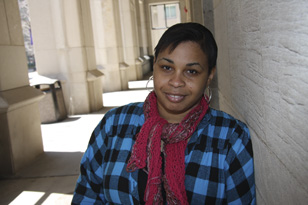Nicole Harris

Nicole Harris (Photo: Jennifer Linzer)
Convicted of murder after judge
barred highly exculpatory testimony
At age 6, Diante Dancy believed in Santa Claus and the Tooth Fairy—which, according to Cook County Circuit Court Judge Lon Shultz, rendered him an unfit to witness at his mother’s 2005 trial for the murder of his younger brother, Jaquari Dancy.
Had Diante testified, he would have told the jury, as he had told the police all long, that Jaquari had been pretending to be Spiderman when he accidentally strangled himself to death with an elastic band from a fitted sheet in the bedroom the boys shared in the family apartment on the northwest side of Chicago.
The jury found the mother, 23-year-old Nicole Harris, guilty, and Shultz sentenced her to 30 years in prison—where she no doubt would still be if the U.S. Court of Appeals for the Seventh Circuit had let the conviction stand.
But in October 2012 the Seventh Circuit reversed Harris’s conviction, holding that that Shultz’s exclusion of Diante’s exculpatory testimony had been “arbitrary and disproportionate to the truth-seeking and reliability concerns advanced by witness competency restrictions.”
The conviction rested solely on a dubious videotaped confession that Chicago Police obtained from Harris the day after Jaquari died.
The confession, which Harris promptly recanted, calling it false and coerced, occurred two months before an Illinois law requiring police to record the entire custodial interrogation of murder suspects went into effect. Although the recording equipment required by the new law was in place, detectives chose to record only Harris’s statement and nothing that preceded it.
After learning of the confession, the Cook County Medical Examiner’s Office, which initially had ruled the death accidental, changed the cause to homicide.
After Harris’s conviction, she wrote to CWC legal director Steven A. Drizin, who had developed expertise in false confessions. Alison Flaum, then a CWC staff lawyer, and Robert R. Stauffer, a partner at Jenner & Block working pro bono, accepted the case. They filed a motion for a new trial, which Shultz promptly denied.
The CWC-Jenner team then appealed the case through the state and federal systems, losing at every turn until last October when the U.S. Court of Appeals for the Seventh Circuit overturned the conviction and directed U.S. District Court James B. Zagel, who previously had denied relief, to grant Harris’s petition for a federal writ of habeas corpus, ordering the state to retry or release her within 120 days.
Harris was released from prison on February 25, 2013, while the State’s Attorney’s Office sought review of the case by the U.S. Supreme Court, which in early June 2013 declined to hear the case.
On June 17, at a brief hearing before Presiding Criminal Court Judge Paul S. Biebel, Assistant State’s Attorney Joe Magats moved to dismiss charges, officially exonerating Harris.
On January 23, 2014, Judge Biebel granted Harris a Certificate of Innocence, qualifying her for compensation under the Illinois Court of Claims Act.
Seventh Circuit Court of Appeals decision granting Nicole Harris's petition for a writ of habeas corpus

